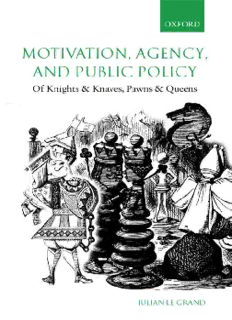
Motivation, Agency, and Public Policy: Of Knights and Knaves, Pawns and Queens PDF
Preview Motivation, Agency, and Public Policy: Of Knights and Knaves, Pawns and Queens
MOTIVATION, AGENCY, AND PUBLIC POLICY This page intentionally left blank Motivation, Agency, and Public Policy Of Knights and Knaves, Pawns and Queens Julian Le Grand GreatClarendonStreet,OxfordOX26DP OxfordUniversityPressisadepartmentoftheUniversityofOxford. ItfurtherstheUniversity'sobjectiveofexcellenceinresearch,scholarship, andeducationbypublishingworldwidein OxfordNewYork AucklandBangkokBuenosAiresCapeTownChennai Dar esSalaamDelhiHongKongIstanbulKarachiKolkata KualaLumpurMadridMelbourneMexicoCityMumbaiNairobi SãoPauloShanghaiTaipeiTokyoToronto Oxfordisaregisteredtrademark ofOxfordUniversityPress intheUK andincertainothercountries PublishedintheUnitedStates byOxfordUniversityPressInc., NewYork ©JulianLeGrand2003 Themoralrightsoftheauthorhavebeenasserted DatabaserightOxfordUniversityPress(maker) Firstpublished2003 Allrightsreserved.Nopartofthispublicationmaybereproduced, storedinaretrievalsystem,or transmitted,inanyform orbyanymeans, withoutthepriorpermissioninwriting ofOxfordUniversityPress, oras expresslypermittedbylaw, or under termsagreedwiththeappropriate reprographicsrightsorganization.Enquiriesconcerningreproduction outsidethescopeoftheaboveshouldbesenttotheRightsDepartment, OxfordUniversityPress,attheaddressabove Youmustnotcirculatethisbookinanyotherbindingorcover andyoumustimposethissameconditiononanyacquirer BritishLibraryCataloguinginPublicationData Dataavailable LibraryofCongressCataloginginPublicationData Dataavailable ISBN0–19–926699–9 13579108642 For Zoe and Polly This page intentionally left blank vii In contriving any system of government, and fixing the several checks and controls of the constitution, every man ought to be supposed a knave and to have no other end, in all his actions, than private interest. By this interest, we must govern him and, by means of it, notwithstanding his insatiable avarice and ambition, co-operate to the public good. (David Hume, ‘On the Independency of Parliament’) I wouldn't mind being a Pawn, if only I might join—though of course I should like to be a Queen best. (Lewis Carroll, Alice Through the Looking Glass) Fancy what a game of chess would be if all the chessmen had passions and intellects, more or less small and cunning;ifyouwerenotonlyuncertainaboutyouradversary'smen,butalittleuncertainaboutyourown;ifyour Knight could shuffle himself on to a new square on the sly; if your bishop in disgust at your Castling, could wheedleyour pawnsoutoftheirplaces;andifyourpawns,hating youbecausetheyarePawns,couldmakeaway from their appointed posts that you might get checkmate on a sudden. You might be the longest-headed of deductive reasoners, and yet you might be beaten by your own Pawns. You would be especially likely to be beaten,ifyoudepended arrogantlyonyour mathematicalimagination,and regarded your passionate pieces with contempt. (George Eliot, Felix Holt: The Radical) This page intentionally left blank Preface I first encountered the quotation from David Hume with which this book opens when preparing for my inaugural lectureas a newlyappointedprofessorattheLondonSchoolofEconomics.University‘inaugurals’ arerather daunting events when new professors deliver a formal lecture to an audience that includes not only their own department's colleagues and students but also staff and students from other parts of the university together with friends and relatives. Most of these know nothing about the area in which the lecturer is working or indeed his or her specialist discipline. So lecturers are supposed to lay out their wares in a non-specialised fashion that both informs and entertains—and that convinces the listeners that the university has made an excellentappointment. Thelecturewassomewhatanaemicallytitled ‘NewVisions ofWelfare’, and mypreparationsforitwerenotgoingwell. Itwassupposedtoreflectuponthedramaticchangesthatatthetime(themid-1990s)hadjusttransformedthewelfare state. These included the break-up of the old state monopolies providing public services such as health care and education,andtheirreplacementbyso-called‘internal’or‘quasi’markets.Inthosepartsofthewelfarestateconcerned withcash benefits, such as socialsecurityand incomesupport,there seemed alsotobea desiretolook outsidetheold ways of doing things, to question the usefulness of cash benefits as a means of achieving redistribution, and to find different ways of reducing poverty and inequality. It was apparent that all these changes represented some kind of cosmicshiftinthinkingaboutpublicservicesandthewelfarestate.Butitwas far from clear exactlywhatthenatureof this shift was and where it had come from. The welfare state had been in existence for fifty years or so, and, despite numerous political and economic crises during that time, its basic form and structure had remained virtually intact during all that time. What was it that had led to these dramatic changes? Why were policy-makers now engaging in radical reforms? Was there a consistent pattern here, one that might give some insight into what really was going on? The passage from Hume gave me a clue to part of the puzzle. In it, Hume appears to be recommending that public policy-makers ought to assume that all those involved with governmental organisations were fundamentally self- interested—knaves—and to design policies accordingly. Yet it was apparent from looking at the history of that prime example of a governmental organisation, the welfare state, that the architects who originally designed it had not followedHume'sdictumatall.Sofarfromassumingthateveryonewasaknave,theyseemtohavebelievedthatpublic service professionals and other
Description: